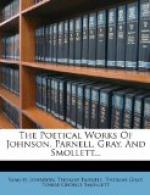The life of this poet has been written by Goldsmith, by Johnson, by the Rev. John Mitford, and others; but, after all, very little is known about him. Thomas Parnell was the descendant of an ancient family, which had been settled for some hundreds of years at Congleton, Cheshire. His father, whose name also was Thomas, took the side of the Commonwealth, and at the Restoration went over to Ireland, where he purchased a considerable property. This, along with his estate in Cheshire, devolved to the poet. His father had a second son, John, whose descendants were created baronets. The late Sir Henry Parnell, for some years the respected member of Parliament for the town of Dundee, where we now write, was the great-great-grandson of the poet’s father. Parnell was born in Dublin, in the year 1679. He was sent to a school taught by one Dr Jones. Here he is said to have distinguished himself by the readiness and retentiveness of his memory; often performing the task allotted for days in a few hours, and being able to repeat forty lines in any book of poems, after the first reading. It is a proof of the prematurity of his powers, that he entered Trinity College, Dublin, at the age of thirteen, where his compositions attracted attention from the extent of classical lore which they discovered. He took the degree of M.A. in 1700; and the same year (through a dispensation on account of being under age) was ordained deacon by the Bishop of Deny. Three years after, he was ordained priest; and in 1705, he was made Archdeacon of Clogher, by Sir George Ashe, bishop of that see. So soon as he received the archdeanery, he married Miss Ann Minchin, who is described as a young lady of great beauty, and of an amiable character, by whom he had two sons, who died young, and a daughter, who long survived both her parents.
Up to the triumph of the Tories, at the end of Queen Anne’s reign, Parnell appears to have been, like his father, a keen Whig. He was at that time, however, induced, for motives which his biographers call obscure, but which to us seem obvious enough, on the well-known principle of the popularity of the rising sun, to change his party; and he was hailed by the Tories as a valuable accession to their ranks. This proves that his talents were even then known; a fact corroborated by Johnson’s statement, that while he was waiting in the outer-room at Lord Oxford’s levee, the prime minister, when told he was there, went out, at the persuasion of Swift, with his treasurer’s staff in his hand, and saluted him in the most flattering manner. He became, either before or immediately after this, intimate with Pope, Swift, Gay, and the rest of that brilliant set, who all appear to have loved him for his social qualities, to have admired his genius, and to have pitied his infirmities. He was a member of the Scriblerus Club, and contributed some trifles to their transactions. He was, at the same time, intimate with Addison and Steele, and wrote a few papers in




